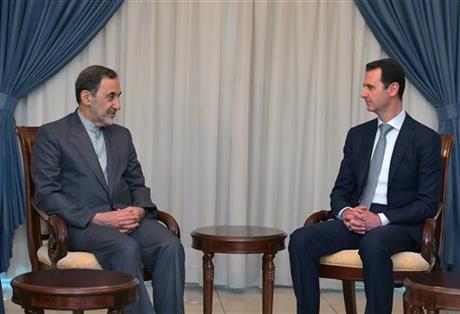
Insurgents in Syria captured the last military base and several small villages in the northwestern province of Idlib on Tuesday, marking the latest collapse of government troops in the region now almost entirely in opposition hands, activists said.
The Britain-based Syrian Observatory for Human Rights said factions — including al-Qaida’s branch in Syria, the Nusra Front, and the ultraconservative Ahrar al-Sham — captured Mastoumeh base after days of fighting. It said government forces left the base and withdrew to the nearby town of Ariha.
The Local Coordination Committees said the Islamic militants targeted the government forces as they were retreating, heading toward Ariha.
In an implicit acknowledgement of defeat, state-run Syrian TV said army units in Mastoumeh base were moving to reinforce defenses in Ariha further south. Ariha is one of the last government holdouts to remain in Idlib.
Government troops withdrew from the provincial capital of Idlib after it fell to opposition fighters in March, followed by the strategic town of Jisr al-Shughour and Qarmeed military base days later.
The Idlib offensive is being led by a unified command known as Jaysh al-Fateh, or Conquest Army, and aided by a new strategic alliance between Turkey and Saudi Arabia to strengthen insurgents fighting to topple President Bashar Assad.
Assad recently acknowledged what he said were recent military “setbacks,” in the war against insurgents trying to topple him, promising a comeback by his troops in northern Syria.
His forces are also engaged in heavy fighting with Islamic State group militants trying to advance toward government-held areas in the central town of Palmyra, an ancient heritage site.
Meanwhile, Assad received support on Tuesday from his top ally, Iran. State-run news agency SANA said Iran is extending a credit line to make up for market needs and reported that the two countries have signed several agreements in the fields of electricity, industry, oil and investment.
The new credit was announced during a visit to Damascus by Ali Akbar Velayati, a top aide to Iran’s supreme leader, Ayatollah Ali Khamenei.
Iran is believed to have supplied his government with billions of dollars since the Syrian conflict began in March 2011. Tehran extended a $1 billion credit line to Syria to help support the local currency in June 2013.
The new credit — it was not clear how much — comes as the Syrian pound’s depreciation has accelerated.
Velayati, who met with Assad on Tuesday, promised continued Iranian support for Syria with everything necessary to boost the Syrian people’s “resistance in defending their homeland and confronting terrorism” and its sponsors. Assad’s government refers to those trying to topple him as “terrorists.



